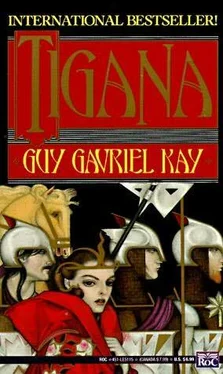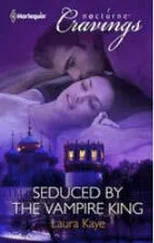Guy Kay - Tigana
Здесь есть возможность читать онлайн «Guy Kay - Tigana» — ознакомительный отрывок электронной книги совершенно бесплатно, а после прочтения отрывка купить полную версию. В некоторых случаях можно слушать аудио, скачать через торрент в формате fb2 и присутствует краткое содержание. Год выпуска: 1990, Жанр: Фэнтези, на английском языке. Описание произведения, (предисловие) а так же отзывы посетителей доступны на портале библиотеки ЛибКат.
- Название:Tigana
- Автор:
- Жанр:
- Год:1990
- ISBN:нет данных
- Рейтинг книги:4 / 5. Голосов: 1
-
Избранное:Добавить в избранное
- Отзывы:
-
Ваша оценка:
- 80
- 1
- 2
- 3
- 4
- 5
Tigana: краткое содержание, описание и аннотация
Предлагаем к чтению аннотацию, описание, краткое содержание или предисловие (зависит от того, что написал сам автор книги «Tigana»). Если вы не нашли необходимую информацию о книге — напишите в комментариях, мы постараемся отыскать её.
Tigana — читать онлайн ознакомительный отрывок
Ниже представлен текст книги, разбитый по страницам. Система сохранения места последней прочитанной страницы, позволяет с удобством читать онлайн бесплатно книгу «Tigana», без необходимости каждый раз заново искать на чём Вы остановились. Поставьте закладку, и сможете в любой момент перейти на страницу, на которой закончили чтение.
Интервал:
Закладка:
Her brother had known it too. Preternaturally grave he had kissed his mother on the forehead and then his sister, and had gone out into the night. It was, of course, illegal to be abroad after nightfall, but something kept driving him out to walk the streets, past the random fires that still smoldered on almost every corner. It was as if he was daring the Ygrathen patrols to catch him. To punish him for having been fourteen in the season of war.
Two soldiers were knifed in the dark that fall. Twenty death-wheels were hoisted in swift response. Six women and five children were among those bound aloft to die. Dianora knew most of them; there weren't so very many people left in the city, they all knew each other. The screaming of the children, then their diminishing cries were things she needed shelter from in her nights forever after.
No more soldiers were killed.
Her brother continued to go out at night. She would lie awake until she heard him come in. He always made a sound, deliberately, so she would hear him and be able to fall asleep. Somehow, he knew she would be awake, though she had never said a word.
He would have been handsome, with his dark hair and deep brown eyes if he hadn't been so thin and if the eyes were not shadowed and ringed by sleeplessness and grief. There was not a great deal of food that first winter, most of the harvest had been burned, and the rest confiscated, but Dianora did the best she could to feed the five of them. About the look in his eyes there was nothing she could do. Everyone had that look that year. She could see it in her mirror.
The following spring the Ygrathen soldiers discovered a new form of sport. It had probably been inevitable that they would, one of the evil growths that sprang from the deep-sown seeds of Brandin's vengeance.
Dianora remembered being at an upstairs window the day it began. She was watching her brother and the apprentice, no longer an apprentice, of course, walking through a sun-brightened early morning across the square on their way to the site where they were laboring. White clouds had been drifting by overhead, scudding with the wind. A small cluster of soldiers came from the opposite side and accosted the two boys. Her window was open to air the room and catch the freshness of the breeze; she heard it all.
"Help us!" one of the soldiers bleated with a smirk she could see from her window. "We're lost," he moaned, as the others quickly surrounded the boys. He drew sly chuckles from his fellows. One of them elbowed another in the ribs.
"Where are we?" the soldier begged.
Eyes carefully lowered, her brother named the square and the streets leading from it.
"That's no good!" the soldier complained. "What good are street names to me? I don't even know what cursed town I'm in!" There was laughter; Dianora winced at what she heard in it.
"Lower Corte," the apprentice muttered quickly, as her brother kept silent. They noticed the silence though.
"What town? You tell me," the spokesman said more sharply, prodding her brother in the shoulder.
"I just told you. Lower Corte," the apprentice intervened loudly. One of the soldiers cuffed him on the side of the head. The boy staggered and almost fell; he refused to lift a hand to touch his head.
Her pulse pounding with fright, Dianora saw her brother look up then. His dark hair gleamed in the morning sunlight. She thought he was going to strike the soldier who had dealt that blow. She thought he was going to die. She stood up at her window, her hands clenched on the ledge. There was a terrible silence in the square below. The sun was very bright.
"Lower Corte," her brother said, as though he were choking on the words.
Laughing raucously the soldiers let them go.
For that morning.
The two boys became the favorite victims of that company, which patrolled their district between the Palace by the Sea and the center of town where the three temples stood. None of the temples of the Triad had been smashed, only the statuary that stood outside and within them. Two had been her father's work. A young, seductively graceful Morian, and a huge, primal figure of Eanna stretching forth her hands to make the stars.
The boys began leaving the house earlier and earlier as spring wore on, taking roundabout routes in an attempt to avoid the soldiers. Most mornings, though, they were still found. The Ygrathens were bored by then; the boys' very efforts to elude them offered sport.
Dianora used to go to that same upstairs window at the front of the house when they left by way of the square, as if by watching whatever happened, sharing it, she could somehow spread the pain among three, not two, and so ease it for them. The soldiers almost always accosted them just as they reached the square. She was watching on the day the game changed to something worse.
It was afternoon that time. A half-day of work only, because of a Triad holiday, part of the aftermath to the springtime Ember Days. The Ygrathens, like the Barbadians to the east, had been scrupulous not to tamper with the Triad and their clergy. After their lunch the two boys went out to do an afternoon's work.
The soldiers surrounded them in the middle of the square. They never seemed to tire of their sport. But that afternoon, just as the leader began his familiar litany of being lost a group of four merchants came trudging up the hill from the harbor and one of the soldiers had an inspiration born of sheerest malice.
"Stop!" he rasped. The merchants did, very abruptly. One obeyed Ygrathen commands in Lower Corte, wherever one might be from.
"Come here," the soldier added. His fellows made way for the merchants to stand in front of the boys. A premonition of something evil touched Dianora in that moment like a cold finger on her spine.
The four traders reported that they were from Asoli. It was obvious from their clothing.
"Good," the soldier said. "I know how grasping you lot are. Now listen to me. These brats are going to name their city and their province to you. If you can tell me what they say, on my honor and in the name of Brandin, King of Ygrath, I'll give the first man who says the name back to me twenty gold ygras."
It was a fortune. Even from where she sat, high up and screened behind her window, Dianora could see the Asoli traders react. That was before she closed her eyes. She knew what was coming and how it was going to hurt. She wanted her father alive in that moment with a longing so acute she almost wept. Her brother was down there though, among soldiers who hated them. She forced back her tears and opened her eyes. She watched.
"You," said the soldier to the apprentice, they always started with him, "your province had another name once. Tell them what it was."
She saw the boy, Naddo was his name, go white with fear or anger, or both. The four merchants, oblivious to that irrelevance, leaned forward, straining with anticipation. Dianora saw Naddo look at her brother for guidance, or perhaps for dispensation.
The soldier saw the glance. "None of that!" he snapped. Then he drew his sword. "For your life, say the name." Naddo, very clearly, said, "Tigana."
And of course not one of the merchants could say back the word he spoke. Not for twenty golden ygras or twenty times so many. Dianora could read the bafflement, the balked greed in their eyes, and the fear that confronting sorcery always brought.
The soldiers laughed and jostled each other. One of them had a shrill cackle like a rooster. They turned to her brother.
"No," he said flatly before they could even command him. "You have had your sport. They cannot hear the name. We all know it, what is left to prove?"
He was fifteen, and much too thin, and his dark-brown hair was too long over his eyes. It had been over a month since she'd cut it for him; she'd been meaning to do so all week. One of her hands was squeezing the window-ledge so tightly that all the blood had rushed away; it was white as ice. She would have cut it off to change what was happening. She noticed other faces at other windows along the street and across the square. Some people had stopped down below as well, seeing the large clustering of men, sensing the sudden tension that had taken shape.
Читать дальшеИнтервал:
Закладка:
Похожие книги на «Tigana»
Представляем Вашему вниманию похожие книги на «Tigana» списком для выбора. Мы отобрали схожую по названию и смыслу литературу в надежде предоставить читателям больше вариантов отыскать новые, интересные, ещё непрочитанные произведения.
Обсуждение, отзывы о книге «Tigana» и просто собственные мнения читателей. Оставьте ваши комментарии, напишите, что Вы думаете о произведении, его смысле или главных героях. Укажите что конкретно понравилось, а что нет, и почему Вы так считаете.










